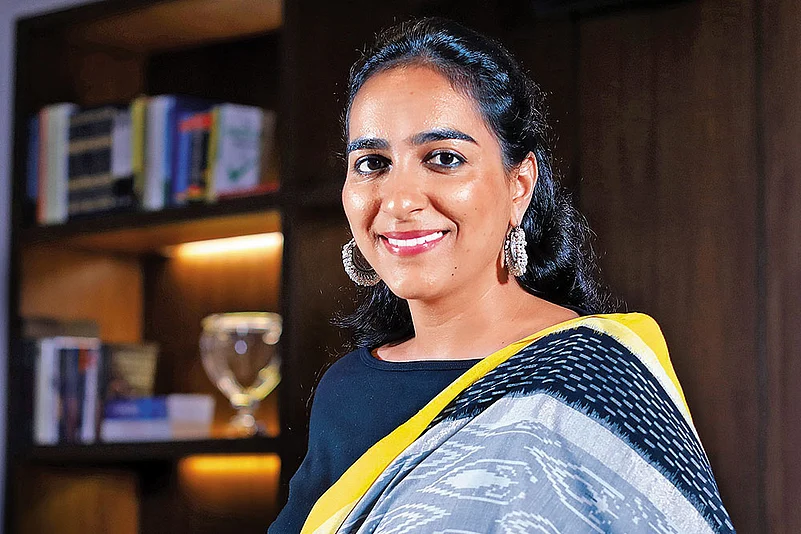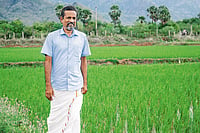Tara Singh Vachani, Founder & Executive Chairperson, Antara Senior Care and Vice-Chairperson, Max India was in her 20s when she set up Antara Senior Care (earlier Antara Living) in 2010. The youngest daughter of Analjit Singh, the founder and chairman of Max Group, wanted to do something of her own and veer away from her father’s well-paved path.
In a country where most family businesses are still inherited by sons while daughters are encouraged to stay away from playing any active role in them, Vachani, who had her family’s backing, defied the norm.
But even when Vachani returned to India after finishing her studies abroad and began interning with the Max Group, her mind kept searching for something else. Her experience at Max, she says, became a very organic one because the companies were very large and were run by professionals. “There was not much space for me at that point in time,” she adds.

“My father was very clear that until we earn our stripes and prove ourselves, there would not be any space for us in the organisation in any capacity. So, even when I initially joined the group, it was for learning and not to necessarily be in a commanding position. Having said that, had Antara not come into the fold, maybe I would have gone in that direction,” Vachani says.
Antara did work out with her father’s backing. Today, Vachani, a mother of two daughters, divides her time between the growing verticals under Antara Senior Care, her philanthropic initiatives and taking care of her family.
Uncharted Territory
It was a chance meeting with an Asian woman in the service department business that gave Tara the idea to get into the senior care space.
“That was the first time this concept came onto my radar and got me thinking. I wondered why anyone had not explored this space in India. Then, with the support of my father, our board and governance teams, it all started taking shape,” she says.
Having said that, getting into a completely new space of business, was not going to be a complete cakewalk for her either. Vachani knew she would face a lot of challenges.
“The biggest challenge was the segment itself which was a completely uncharted territory. Convincing people about this category and the need for it, convincing investors, consumers who were broken into so many sub-segments—their families, lawyers, doctors—and then convincing your team when you are hiring. Everyone had heard of the Max Group so that helped me but, in the early days, I had to make a pitch to every person I wanted to hire and promise that this is an industry that will make sense in the future,” she explains.
It only got more complex with different challenges popping up for different verticals. It was a tall task to get a license and residences in place, explaining to the authorities that it was not a typical residential community, why four car parks for every apartment was not needed and how it was a completely different group that Antara would cater to.
“Now, in the care verticals, we have care at home, care homes and medcare products. It is trying to explain to a consumer that you can get healthcare outside a hospital,” says Vachani.
Thoroughly impressed by the new-age start-up founders, Vachani acknowledges that scions of legacy businesses do have an advantage over entrepreneurs who start from scratch or without a business family background.
“To get people, capital, office space, intelligence and not having to go and really beg for it is a huge advantage. No one can convince me against it,” she states matter-of-factly.
She says that it is priceless in today’s day and age when it is the biggest challenge to get someone to listen to your idea when thousands of others are floating around.
At the same time, she also says, “But that advantage also comes with its pressures and baggage of being extremely conscious and conscientious about doing the right thing and doing the most of what you have been given. So, your room for error, if you are a conscientious person, is very little,” she asserts.
Like Father, Like Daughter?
Entrepreneurship runs in Vachani’s blood. Her grandfather, Bhai Mohan Singh, was the man behind the famous Ranbaxy Laboratories. The business baton was carried by her father as well with the Max Group. Vachani is also the vice-chairperson of Max India, the holding company of Antara Senior Care and the managing trustee of Max India Foundation, the corporate social responsibility arm of the Max Group.

Her father is one of her biggest idols when it comes to entrepreneurship. “The biggest lesson that I have learnt from my father is the power of relationships—of having more intelligent people than yourself in a room. So, now I never feel threatened by people who are more educated or more experienced than me,” she says, who has two degrees under her own belt—a degree in politics and South Asian studies from the National University of Singapore and one in hospitality business strategy and management from École Hôtelière De Lausanne in Switzerland. She has also covered courses in Strategy Management from the London School of Economics.
But, the duo is also different as entrepreneurs. While they share the basic values, Vachani believes that she lacks the risk-taking abilities of her father. “Also, I do not think I can work as hard as he does. Even today, the number of hours that he puts in, I can never do that,” she says.
That is also because of how he started his entrepreneurial journey, she adds. “For him, it was all or nothing. He had no choice but to make it work. He created the Max Group to give his family financial autonomy away from my grandfather and my uncles, so he had to take risks.”

Tara Singh Vachani
She opens up about the safety net that she enjoys but also talks about being extremely prudent about it. “I do not take it for granted even for a second. In fact, it pushes me harder,” she adds.
Vachani also believes that famous last names are fast losing their significance. They may still carry that faith and respect but the fact that it will be equalled with success will not happen.
“I think that perhaps you will not be given that same level of respect as someone who really made it on his or her own. There is so much talent and intelligence in the system that if you have the capacity to make it, you will make it,” she says.
Sense of Achievement
Vachani believes that her biggest gain has been to be able to establish senior care as a separate segment or industry in India.
Over the years, several players have entered the segment in different capacities but few have been able to diversify across verticals. Vachani is glad that at least more communities for the elderly are getting created. While she has no plan to go global immediately, she does not deny its possibility in the future.
“We were the first to create an offering encompassing the physical, mental and emotional aspects of health. We saw the industry emulate that. Then we saw players coming in to provide companionship and trying to deal with the loneliness and isolation of seniors. Next came web platforms selling products for seniors. Fnally, in the last two-three years, we have seen a digital push of healthcare services for seniors,” she says.
But despite the digital activity in the space, Tara believes that for the next 50 years, the physical offering of services will be critical. “Engaging with the consumer face to face is crucial in our line of business,” Vachani explains.
The Covid-19 pandemic also brought out a completely new side of Vachani’s business. Suddenly, people started understanding the importance of communities such as Antara. “We locked down Antara Dehradun 10 days before the national lockdown. But, unlike people across the country and the world, who were feeling the pangs of isolation and depression, people at Antara continued living their holistic and normal lives.”
The result? The annual sales in Antara Noida, which was launched in January 2020, equalled Antara Dehradun’s sales in four years.
“The velocity I achieved in Antara Dehradun in the last two years was double the velocity I achieved per month over the last five years because people suddenly realised that if we can get an ecosystem with this level of support, why are we sitting in isolation and fending for ourselves?” Vachani says.
Vachani also wants to do something in the early education space. She currently chairs the Teach for India’s Delhi regional board and is also part of the national board. Antara, however, will always remain the idea that gave wings to her entrepreneurial dreams.
The First Cheque
Tara Singh Vachani has got the Rs 5 lakh cheque given to her by the first resident of Antara Dehradun, framed for her office. This couple had approached her as the wife, who was a cancer patient, knew that her days were limited. Even though the project got delayed by a year, the woman remained in constant touch with Vachani till the couple was able to move in finally. “I am holding on because I want to shift to Antara with my husband, see him settle down and then let go,” she told Vachani. After 10 months of moving in, the woman passed away. The husband still stays at Antara Dehradun.































